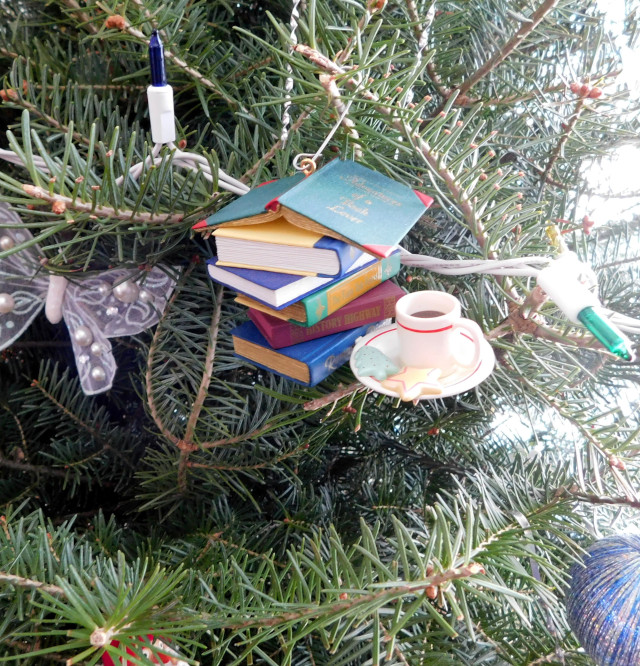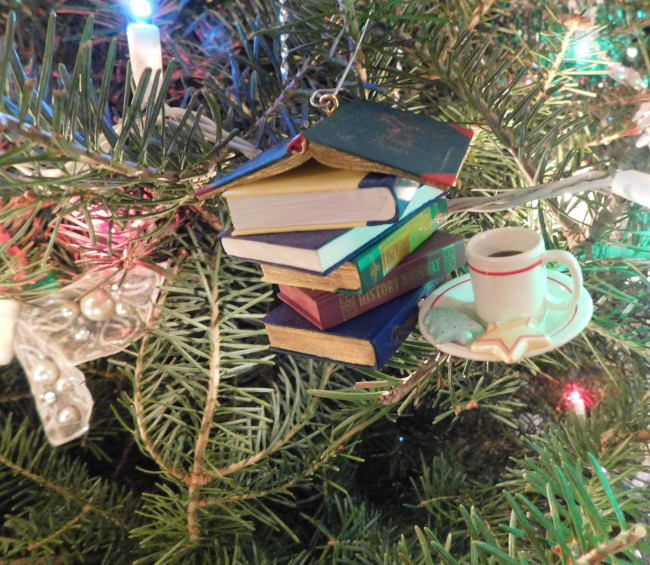
My friend gave me an ornament for Christmas, years ago. It’s a tiny wooden stack of books with a teacup on the side. I thought it was perfect; as teachers of English literature, we both knew that Christmas and books go together.
Books are excellent gifts – they offer whole new worlds to dwell in, just when the season and the typical Canadian prairie weather make the very thought of a good book and a comfy reading spot irresistible. Add a hot beverage, preferably a hot rum toddy, and all’s well.
The connection between Christmas and books was made for me in elementary school. I remember mostly school and church concerts, ending always with those familiar brown paper bags containing peanuts in the shell, candies, a chocolate or two, and an orange. I also remember one car-in-the-ditch-in-a-snowstorm episode; huge Christmas trees in our farmhouse living-room, decorated with homemade ornaments (strings of popcorn, gold-painted walnut shells), a very few presents under the tree, but always plenty of food, including all kinds of traditional cookies.
At school, each classroom had a Christmas box; we drew a name of a classmate and bought a present. That was more stressful than exciting because I worried about asking for money to buy something; money was not given out easily. Besides, I had absorbed my mother’s fear that whatever I bought wouldn’t be good enough.
Yet there was one golden moment, probably in Grade 4 or 5. I received a book! Could that have been my first? It seems so. In the next few weeks, I must have reread Little Women by Louisa May Alcott several times. And I reread it in subsequent years, too, until the beautiful hard cover became quite shabby. And each time my tears welled up at the scenes of Beth’s death and Jo’s refusal of Laurie.
I have received many books as gifts since then, always welcomed. There’s something magical about unwrapping a book – what will it be? what kind of world will I be able enter? Will this be a treasured book that I will reread and reread?
In memory of that gift, I offer to all my readers, not actual books, but book suggestions. Maybe one of these books will invite you into a world that you needed to visit or wanted to visit or didn’t even know that you would be delighted in. I hope so.
Herewith my eclectic offerings, chosen for various reasons, listed in no particular order, with brief comments:
Guy Gavriel Kay’s Tigana. Not quite the best fantasy ever written (that honor is still held by The Lord of the Rings), but very close. Gavriel Kay creates detailed, coherent worlds with memorable characters and causes worth fighting for. Make sure you begin this one when you will be uninterruptible because the world of Tigana is hard to leave.
Nora Gallagher’s Moonlight Sonata in the Mayo Clinic. The realm of undiagnosed serious illness is not one we willingly enter, yet this memoir drew me in, repeatedly, initially because her spiritual journey was shared so honestly. On my third or fourth reading, during my own illness, her key metaphor of living in the Land of Oz made complete sense. Perhaps not recommended to those who work in health care because their familiarity with that world can blunt the effect of Gallagher’s excellent prose.
Lawrence Hill’s Any Known Blood. I could recommend other novels by Hill, but this is the one I read most recently. His exploration of five generations of one family is both tender and searing; by the fifth Langston Cane, the pigmentation is more white than black, yet the racism is still felt bone deep. It is a troubling tale, yet the strength of the human spirit and existence of genuine goodness is always there.
Richard Wagamese’s For Joshua. This memoir by one of Canada’s best known Indigenous writers is a record not only of what it’s like to fall and fall again, but also of the possibility of getting up again and living through and past the pain. It’s also a story of what it’s like to fail as a parent and yet have something to give to the next generation.
Ken Wilbur’s A Brief History of Everything. For those who want an intellectual challenge, enjoy exploring immense ideas, and delight in imagining what might be possible. Wilbur is a well-recognized philosopher and writer on transpersonal psychology. He can be incredibly dense and theoretical, but this book is accessible and leavened with a quixotic sense of humor. For me, it was a wonderful discovery.
Kathryn Mannix’s With the End in Mind: Dying, Death, and Wisdom in an Age of Denial. The title is daunting, isn’t it? Even downright off-putting. To my surprise, I was captivated from the beginning. Mannix is a palliative care physician and she shares willingly the wisdom her patients have taught her. She’s also a compelling writer. Each vignette will hold your heart.
Barbara Brown Taylor’s Holy Envy: Finding God in the Faith of Others. Part memoir, part theology – maybe more memoir than anything else. Taylor is the only writer I know who can publish whole books of sermons and be completely readable, engrossing even. In this book, Taylor, a former Episcopalian priest, recounts her experiences in the university classroom teaching introductory religious studies courses. She does field trips, lots of them, and she and her students explore other religions, each from his or her own context of faith or not-faith. It’s an honest book, and a hopeful one. A peace-making book, in fact.
Sara Maitland’s A Joyful Theology. Yes, it is a book of theology, but it’s written by a novelist with a strong sense of story and a marvellous style. It was the “joyful” bit of her title that piqued my curiosity and then I was charmed by her willingness to revisit Christian doctrine in the light of recent astrophysics and mathematics. She handles both the Bible and human discoveries with thoughtfulness, even reverence.
Anne Perry’s The Face of a Stranger. Which is the first in a very long series of detective novels set in Victorian times and featuring the complex figure of Detective William Monk. Perry’s novels have taken me through the pandemic, offering a blessed escape from the stresses of a polarized, anxious world. Perry’s novels do follow the genre template of detective novels and her own patterns of character interaction and methods of building suspense. However, her detailed depiction of Victorian life, her analysis of characters, and her passionate exploration of social issues have kept me hooked and will keep me hooked, I suspect, until I’ve read them all.
So there you are – a few recommendations among the many, many that I would gladly offer.
I would like to wish all my readers a very Merry Christmas and a Happy New Year.

What on earth could be more luxurious than a sofa, a book, and a cup of coffee? . . . Was ever anything so civil?
Anthony Trollope
